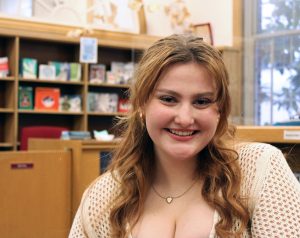Working to Bridge the STEM Gender Gap
 Technology has been an integral part of Julia Crume’s life from an early age. She grew up playing video games with an older brother who also had a passion for tech and building his own computers.
Technology has been an integral part of Julia Crume’s life from an early age. She grew up playing video games with an older brother who also had a passion for tech and building his own computers.
In high school, she attended Mooresville Public High and excelled in math, eventually taking her first programming class, AP Computer Science, as a senior. Throughout her education, she frequently felt unwelcome by her predominately male classmates.
“I was in a lot of high-level math classes, and I had some jerks in my classes. That kinda fueled my fire.”
Julia acknowledged that her reaction was not the typical one. For a research paper in high school, she found out that the majority of women leave STEM fields in middle school due to a lack of support from teachers and classmates. She decided she wanted to help change that. During her junior and senior years of high school, which were impacted by COVID, Julia began asking women in STEM fields to make encouraging videos that she could share with middle school girls in the area.
She continued her outreach work when she got to UNC, joining several clubs such as UNC FEMMES (Females Excelling More in Math, Engineering, and Science) and STEM Sisters, where she became a community outreach executive as a sophomore. For UNC FEMMES, she is the counselor director for their day camp, where they bring fourth through sixth-grade girls to campus to learn about science from volunteer professors and graduate students from the Triangle.
She also helps organize Women in Tech Week on campus, where different businesses and clubs host activities celebrating and encouraging women in tech. The event includes interview practice for those who are applying for jobs in the field. She is also part of the student technology council at UNC.
Julia has amassed an incredibly comprehensive list of community involvements while also working a part-time job at the software survey company Qualtrics. While she acknowledges that it can be a lot, especially while balancing student life and homework, she describes these projects as incredibly fulfilling to her.
“When you’re in college and you’re getting so burned out from STEM, it’s nice to be reminded of what made you love it in the first place. To see these girls get so excited about making slime and other silly things, it’s amazing.”
Julia also credits the SILS staff for inspiring and supporting her as she explored her various passions in technology.
“I started off [majoring in] Computer Science. As much as I liked coding I wanted to learn more, and so then I was suggested to look into Information Science. I loved that I got a better overall understanding of the business side of technology and I was still able to code. The really cool thing about SILS is how supportive they are. A SILS class was my first class in college where the professor memorized everyone’s names, and it was a big class. It meant a lot to me.”
She reflected especially fondly on her experience in her Information and Computer Ethics class with Dr. Dianne Martin, a former programmer for Apollo missions 8 and 11.
“I took a class with her in computer ethics, and we talked about the ethics of AI and other up-and-coming technologies. Our end-of-semester project was a research presentation at the SILS showcase. The Dean of SILS came, and we got to present what we found to an audience.”
Julia still has one more year left of undergraduate education at UNC, and currently only has her capstone project class left before she completes her Information Science major. Despite all of her other commitments, she is now working on a second major in New Media and a minor in Data Science. Like many juniors, Julia does not quite know what she wants to do as a career after she leaves UNC, but she knows advocacy for women in STEM is still in her future.
“I don’t want to have to think about other little girls experiencing the same things I did. I was fortunate that I had brothers who helped me have thick skin but also supported me. Not everyone has that, so hopefully soon other girls won’t have to fear things like that ever again.”
By Will Hassell
Communications Student Intern
Related Programs: Bachelor of Science in Information Science (BSIS)
